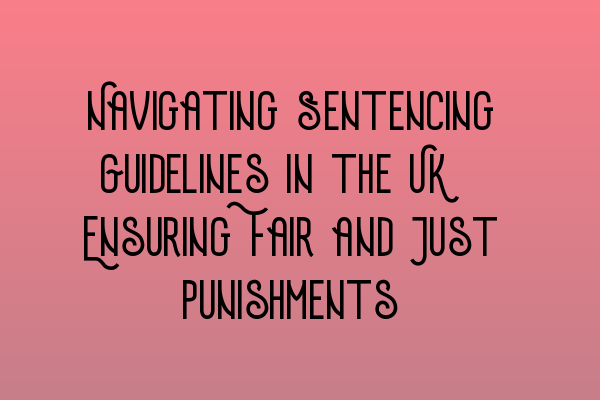Navigating Sentencing Guidelines in the UK: Ensuring Fair and Just Punishments
Welcome to the SQE Criminal Law & Practice Law UK blog! In this article, we will explore the complex world of sentencing guidelines in the UK and discuss the importance of ensuring fair and just punishments for offenders.
Understanding Sentencing Guidelines
The UK judicial system follows specific guidelines when determining the appropriate sentence for a criminal offense. These guidelines are designed to ensure consistency and fairness in the sentencing process.
When a judge or magistrate is faced with sentencing a defendant, they consider various factors such as the severity of the offense, the offender’s culpability, any aggravating or mitigating circumstances, and the impact on the victims or society as a whole. The sentencing guidelines provide a framework for considering these factors and help ensure that similar offenses receive similar punishments.
It is important for solicitors to have a thorough understanding of the sentencing guidelines to effectively represent their clients. By analyzing the relevant guidelines and case law, a solicitor can argue for a fair and appropriate sentence that takes into account all the relevant factors.
The Role of a Solicitor in Navigating Sentencing Guidelines
As a solicitor, it is your responsibility to guide your clients through the complex process of sentencing. Your knowledge of the sentencing guidelines will help you advise your clients on the potential consequences they may face and what steps can be taken to mitigate their sentence.
By thoroughly examining the facts and circumstances of the case, you can identify any mitigating factors that may influence the judge’s decision. This could include factors such as the defendant’s previous good character, their genuine remorse, or any extenuating circumstances surrounding the offense.
Furthermore, staying up-to-date with recent developments in sentencing law is crucial. New precedents and changes in legislation can impact the sentencing guidelines and may allow for more lenient or stricter punishments. Regularly reviewing and studying relevant articles, such as SQE Exam Prep: Essential Study Materials for Aspiring Solicitors and Demystifying the Solicitors Qualifying Examination Format, can help you stay informed and provide effective representation for your clients.
Ensuring Fair and Just Punishments
One of the fundamental principles of the UK legal system is the concept of proportionality in sentencing. This means that the punishment should be proportionate to the seriousness of the offense committed. Sentencing guidelines play a crucial role in achieving this principle.
By understanding the intricacies of the guidelines and considering all the relevant factors, solicitors can advocate for fair and just punishments. This ensures that offenders are held accountable for their actions while also taking into account their personal circumstances and the potential for rehabilitation.
It is also important to remember that sentencing is not solely about punishment but also about protecting the public and preventing future crimes. By carefully analyzing the sentencing guidelines and crafting persuasive arguments, solicitors can help shape the outcome of a case in a way that promotes rehabilitation and reduces the likelihood of reoffending.
For further information on related topics such as LLC formation and business regulations in the UK, we recommend reading the following articles:
- LLC Formation Made Simple: Step-by-Step Guide for UK Entrepreneurs
- LLC Formation: A Step-by-Step Guide for UK Entrepreneurs
- Business Regulations in the UK: A Comprehensive Overview
Thank you for reading our blog post on navigating sentencing guidelines in the UK. If you have any questions or need legal assistance, please don’t hesitate to contact SQE Criminal Law & Practice Law UK.
